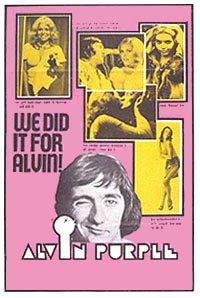
ALVIN PURPLE
Australia, 1973, 97 minutes, Colour.
Graeme Blundell, George Whaley, Penne Hackforth Jones, Lynette Cullen, Jackie Weaver, Noel Ferrier, Jill Foster.
Directed by Tim Burstall.
Alvin Purple was one of the earliest films of the Australian film renaissance of the 1970s. There had been a number of films made in the late 60s, small budget and films which did not travel. However, in 1972, with The Adventures of Barry Mc Kenzie directed by Bruce Beresford, the renaissance seemed to begin with public and government support.
Director Tim Burstall had made 2000 Weeks as well as the David Williamson play Stork with Bruce Spence. Stork was a breakthrough, a transfer from the independent stage in Melbourne to sex comedy. Alvin Purple takes up the theme of sex comedy and with Graeme Blundell, creates Australia's own sex symbol. Tim Burstall directs with tongue in cheek.
Graeme Blundell proves irresistible to women and a number of young women stars of the early 70s, including Jackie Weaver, were in pursuit. The screenplay was written by Alan Hopgood, playwright and actor (And The Big Men Fly). There were many cheeky jokes, a saucy approach to sexuality and the Australian male. The film received a Restricted certificate in 1972.
In 1973, there was a sequel which had Graeme Blundell in two roles, with Alvin Purple having to impersonate a gangster. The comedy was broader, one might say a little less subtle than Alvin Purple. It was directed by one of the editors of the original film, David Bilcock. The Alvin Purple films were the beginning of a collaboration between Tim Burstall and Village Roadshow Cinemas who began work in production and ventured into a number of films in the 70s, for example End Play and Eliza Fraser, both directed by Burstall.
In retrospect, Alvin Purple might seem rather tame but it was modelled on some of the sex comedies of the 1960s, especially those from Scandinavia, like Bedroom Mazurka. It was the Australian film industry proving that it could do sex comedies and romps as well as anybody else could - or, perhaps, better.
1. A successful comedy? What is its major appeal? How tasteful was the comedy? How witty and clever?
2. How important was the character of Alvin for the success of the film? As an Australian hero? The importance of his naivety and innocence? The importance that he was pursued by women? The role of sex - reality and fantasy, dream,, fulfilment, wishes? The use of sex and being used? How did Alvin fit into this framework? Did he contrast with Spike, for instance?
3. How valid was the comedy about sexuality? The tone of the prologue in the tram? The youthful pursuit of Alvin? His jobs? The psychology and the relationship with sexuality? His consultations and therapy? the ironies in the trial sequence?
4. Why was the school comedy so successful? Alvin's relationship with the headmaster's wife? The slapstick aspects?
5. The importance of Alvin at the beginning of his career - the comedy of the birthday party? The various jobs? The mattress testing and the varieties of clients - the painting, the female impersonator etc? What point was being made by the selection of these comic instances?
6. The satire as regards psychologists and sexuality? The psychologist, Miss Sort? Her detachment and involvement and the satire on this? As contrasting with Alvin's neighbours, who borrow sugar? The importance of the satire in Mac Burnie? Poking fun at the irony and exaggerations - the furnishings of Mac Daniel's rooms?
7. How satirical were the sexuality scenes of the various clients - the satire on repressions etc?
8. How was this all gathered together in the court sequences? The humour of the judge, Dr. Sort? The showing of the films, the producers having their cake and eating it as regards pornography?
9. The importance of the relationship with Tina - her contrast with the other women? The genuine sequences of a relationship with Alvin and Tina? Her reaction to the court sequences?
10. How hilarious were the chase sequences? Or were they contrived and derivative? The car chase, the plane and the sky-diving? The chase in the city itself?
11. The humorous touch and the irony of meeting the psychologist again?
12. The satisfying ending with the overtones of the Decameron?
13. What values about humanity, sexuality, dignity did the film pre-suppose to make it satisfying entertainment?